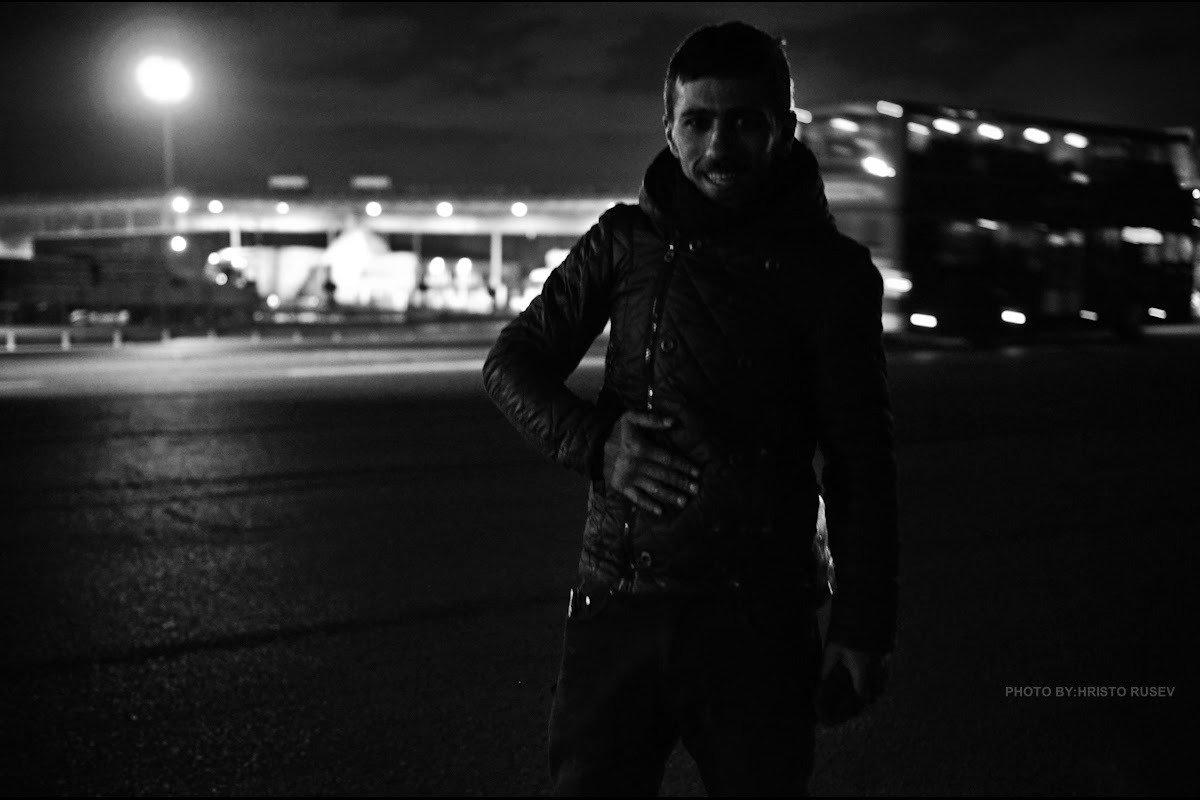AUTHOR: MILLENA MIHOVA PHOTOGRAPHER HRISTO RUSEV
„Гладът може да те направи толкова смел, че да се изправиш и срещу лъв! Аз си изкарвам прехраната в една особена джунгла – градската. Дали ме е страх?! Не, нуждата ми от хляб на трапезата е по-силна от страха”. Така започва изповедта си 28-годишният кюрд Мустафа. Той е сред стотиците млади мъже, които всяка вечер се изправят срещу хаотичния и бесен трафик на Истанбул, за да продават вода, плодове и сладки на забързаните шофьори. Разходката сред хвърчащите автомобили не е за хора със слаби нерви, но Мустафа и колегите му не се тревожат за живота си, защото знаят че у дома ги чакат семейства. А гладът е по-силен от страха. Равносметката от една нощ в истанбулската джунгла са 50-60 лири печалба, огромен риск от инциденти и сигурността, че на следващия ден пак ще е същото. Повечето улични търговци пристигат от малки градчета в Анадола и са обучени в тънкостите на търговията в трафика още от деца. Опасният занаят е забранен. Но рейдовете на полицията и конфискуваната стока не спират продавачите за дълго. Всеки час пик носи надежда за хляб на масата още една вечер.
Photo by © Hristo Rusev 2015
English Text
“Hunger can make you brave enough to face a lion”, says 28 year old Mustafa. Every day, to make a living he performs an act that many would consider suicidal. Instead of facing lions, the young Kurd takes on the heaviest traffic in Istanbul. “It’s a special kind of jungle, the city jungle. Do I feel fear?! Well, my need for bread is stronger”, the street trader explains. Mustafa has been selling water, snacks and sweets to drivers in the rush hour for 23 years. “I started when I was 5. Who could refuse a child.”, he adds. Born in a small town in Anatolia, the street trader now regards himself a citizen of Istanbul. It is past 10,30 p m and the last bag of pretzels is nearly empty. The flow of vehicles towards Ataturk bridge is still excessive. Mustafa’s tiny figure disappears between cars and trucks from time to time. Somehow he manages to emerge safe and well every time. But accidents happen. “When they do it is always traders’ fault. Drivers are always clear of charges”, the young man says. While Mustafa has never sustained serious injuries some of his colleagues weren’t that lucky. The list of stories about broken bones seems endless.
Photo by © Hristo Rusev 2015
Photo by © Hristo Rusev 2015Photo by © Hristo Rusev 2015
Photo by © Hristo Rusev 2015
Photo by © Hristo Rusev 2015
Photo by © Hristo Rusev 2015
Photo by © Hristo Rusev 2015
Photo by © Hristo Rusev 2015
Photo by © Hristo Rusev 2015
Photo by © Hristo Rusev 2015
Photo by © Hristo Rusev 2015
“We don’t have much choice, we have to have food on our table”, adds 30 year old Erdjan who is occupying a “working place” right next to Mustafa’s. He looks quiet and chary compared to his colleague. “If you are lucky you can make between 1000 and 1200 liras a month. This is about what you need to get by. Everything is expensive in Istanbul. It is much better to have at least one more working member of the house hold but I live alone.”, he explains. Erjan, who is also originally from Anatolia, has been involved in street trading business for 20 years. He has perfected the art of walking between sometimes speeding cars holding his goods high so they can be seen while guarding himself against the ill fate. Mustafa and Erjan together with a hundred other street traders represent the lowest level of street trading. They work for themselves but are periodically supplied with goods by traders with cars who represents the higher level in the hierarchy.
Photo by © Hristo Rusev 2015
“A sold box of 100 bananas means 60 liras profit for me”, tells Mustafa. Most of the prices in street trading vary between 1 lira and 3,5 liras. Neither the drivers nor the traders care for a change.
Photo by © Hristo Rusev 2015
It is not the rude drivers that trouble the traders most it’s the police. “We are not supposed to be here. When the patrolling cars spot us they can confiscate all we have and fine us. It happens. But what we do is a decent way of making a living. They have no right.”, the Kurds say. Both Mustafa and Erjan confess to be devoted Muslims. “Our dignity is defined by our faith. Our needs are simple – we only want bread on the table at night”, tells the 28 year old. That particular night the traffic is disturbed by the presences of the escorts of some authority figures. So the traders are fewer than usual. They all work in perimeters of about 100 meters each and rarely change places from night to night. Most of them, just like Mustafa and Erjan come from poor families from Asian provinces. Due to their social status and not sufficient qualifications they hardly have a choice but to join the street trade. The road to Ataturk bridge and the road to the international airport of the same name are the busiest trading areas. “It is a matter of survival for those people. I know how hard it is. They are not here for fun. But their presence is extremely challenging for us, the drivers. Sometimes when you are tired of working the last thing you need is a human being jumping before your car, trying to sell you sweets”, ponders the Bulgarian businessman Hristo Hristov who travels to Istanbul on regular basis.
Text: Milena Mihova
Photographs: Hristo Rusev
















Няма коментари:
Публикуване на коментар